Agronomist
Entry Level Qualification
10
Career Fields
Agriculture & Food Science
For Specially Abled






Career Entrance Exam
BHU UET, BHU PET, BHU RET, WBJEE, KEAM, TSEAM CET, AP EAPCET, ICAR UG, ICAR PG, ICAR PHD
About Career
Agronomists are soil and crop scientists who work to improve the productivity of agricultural soil to ensure higher farm yield from the same amount of land. Agronomy deals with the study of crops and the soil in which they grow as well as the influence of climatic variations on agricultural output. As an Agronomist, you will work to ensure high fertility of the seeds as well as the land.
As an Agronomist, you will be studying soil, seeds, plants, crops and other agro-based products to better understand farm needs and plan more efficient and effective farming practices. You will be responsible for finding effective solutions for the farming and food industry. You may take samples to make observations, conduct research or field checks, and identify and solve issues associated with plant or soil nutrition, damage caused by insects or wildlife, weather or climate differences, or the use of pesticides, fertilizers, etc.
After completing your education in Agricultural Sciences or related fields, you may be involved in research and developmental activities (lab experiments) in a laboratory setting or you may also do field-based or office-based work including looking for information virtually (on the Internet) or interacting with f–armers and agricultural workers to collect real-time production data (their personal experiences and to collect soil or crop samples) for work projects.
Key Roles and Responsibilities
As an Agronomist, you will be engaged with one or more of the following roles and responsibilities: -
1. You will be involved in studies and analyses concerning crops (food - vegetables, cattle feed, turf – rice, wheat, and fiber crops – jute, cotton), types of soil, climatic variations and their influence on agricultural activities and processes.
2. You will be working on increasing the productivity, yield & distribution of farm yields by studying the resistance to insects / diseases in crops, most suitable pesticides for a particular crop / soil, creating new and better plant / hybrid products with dedicated research, preservation of desirable qualities in different soil types.
3. You will be involved in developing plans for proper disposal or partial use of animal waste, prevention of soil erosion, and reduction in use of harmful chemicals.
4. You will be observing action of microbes upon soil and living tissues of crop plants.
5. You will be involved in monitoring or performing tests on crop specimens, soil samples, and water for detecting harmful microorganisms or for obtaining information about pesticides, chemicals or infectants.
6. You will be investigating the relationships between varieties of crops with associated climatic (precipitation, temperature etc.) and soil conditions, the effects of pesticides and fertilizers on crops.
7. You will be operating or monitoring the use of a variety of specialized laboratory techniques and equipments.
8. You will be preparing or supervising the preparation of technical reports and compilations based upon research outcomes.
9. You will be coordinating with participating agricultural scientists, agronomists, other biological technologists, technicians, agricultural workers, investors, clients etc.
10. You will be involved in conducting research regarding new technologies, experimental techniques, instruments and laboratory supplies that can improve agricultural standards as well as operating procedures and outcomes.
11. You will be ensuring that no harm is posed to the larger ecosystem while tweaking the traditional agricultural processes during your research or work activities.
Career Entry Pathway
Class 11-12 Science along with any subject as per scheme of studies – B. Sc.or B. Voc.
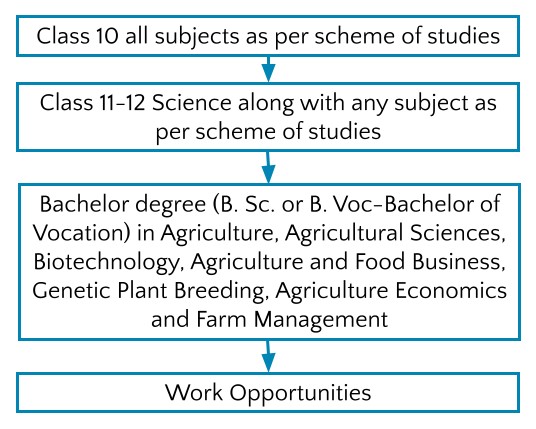
After Class 11-12 Science along with any subject as per scheme of studies, you can go for a Bachelor degree (B. Sc. or B. Voc-Bachelor of Vocation) in Agriculture, Agricultural Sciences, Biotechnology, Agriculture and Food Business, Genetic Plant Breeding, Agriculture Economics and Farm Management, Animal Husbandry, Forestry, Soil and water management, Horticulture, or similar disciplines.
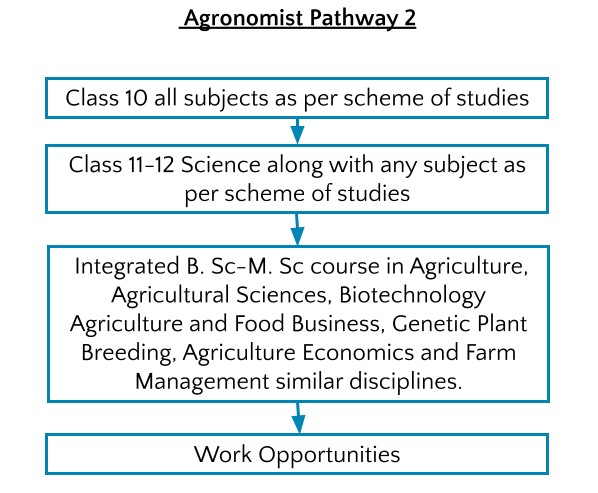
After Class 11-12 Science along with any subject as per scheme of studies, you can go for an Integrated B. Sc-M. Sc course in Agriculture, Agricultural Sciences, Agriculture and Food Business, Genetic Plant Breeding, Agriculture Economics and Farm Management, Animal Husbandry, Forestry, Soil and water management, Horticulture or similar disciplines. This is usually a 6-year course. You also have an option later to go for Ph. D programsin Agricultural Sciences, Agricultural Climatology or related disciplines, Molecular Reproduction, Development & Genetics, Ecological Sciences, Molecular Biophysics, Microbiology & Cell Biology or similar disciplines.
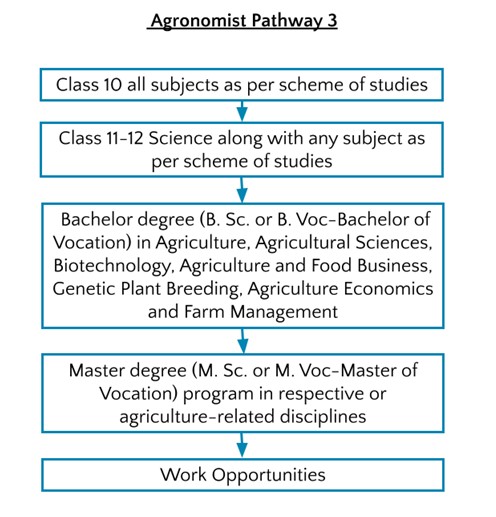
After Class 11-12 Science along with any subject as per scheme of studies, you can go for a Bachelor degree (B. Sc. or B. Voc-Bachelor of Vocation) in Agriculture, Agricultural Sciences, Biotechnology, Agriculture and Food Business, Genetic Plant Breeding, Agriculture Economics and Farm Management, Animal Husbandry, Forestry, Soil and water management, Horticulture, or similar disciplines. Then you may go for a Master degree (M. Sc. or M. Voc-Master of Vocation) program in respective or agriculture-related disciplines.
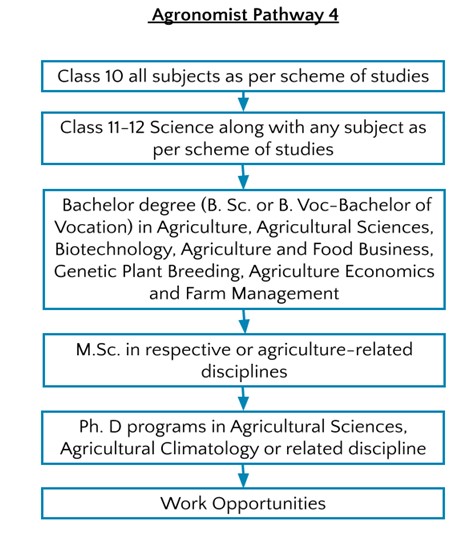
After Class 11-12 Science along with any subject as per scheme of studies, you can go for a Bachelor degree in Agriculture, Agricultural Sciences, Biotechnology, Agriculture and Food Business, Genetic Plant Breeding, Agriculture Economics and Farm Management, Animal Husbandry, Forestry, Soil and water management, Horticulture, or similar disciplines. Then you may go for a Master degree program in respective or agriculture-related disciplines. Then you may go for Ph. D programs in Agricultural Sciences, Agricultural Climatology or related disciplines, Molecular Reproduction, Development & Genetics, Ecological Sciences, Molecular Biophysics, Microbiology & Cell Biology or similar disciplines.
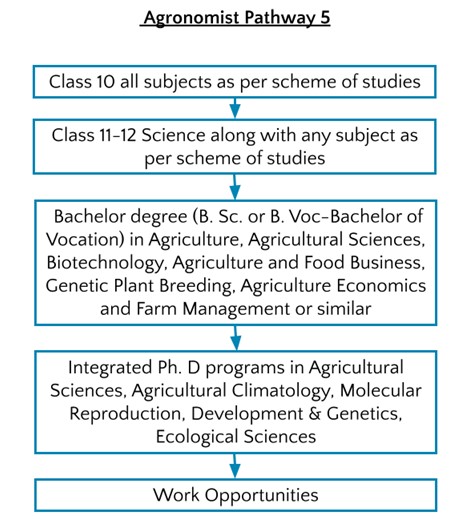
After Class 11-12 Science along with any subject as per scheme of studies, you can go for a Bachelor degree in Agriculture, Agricultural Sciences, Biotechnology, Agriculture and Food Business, Genetic Plant Breeding, Agriculture Economics and Farm Management, Animal Husbandry, Forestry, Soil and water management, Horticulture, or similar disciplines. Then you may go for Integrated Ph. D programs in Agricultural Sciences, Agricultural Climatology or related disciplines, Molecular Reproduction, Development & Genetics, Ecological Sciences, Molecular Biophysics, Microbiology & Cell Biology or similar disciplines.
Required Qualification & Competencies
1. After Class 11-12, you can go for a Bachelor degree in Sciences (B. Sc) or Integrated M. Sc programs.
2. After your graduation, you can go for a Master level program (M. Sc) or Integrated Ph. D programs.
3. You may also opt for post Doctoral studies after obtaining a Ph. D.
Various private/public educational establishments offer these or related courses:
1. Agriculture
2. Agricultural Sciences
3. Agronomy
4. Crop Sciences
5. Soil Sciences
6. Agricultural Biochemistry
7. Agricultural Biotechnology
8. Agricultural Chemicals
9. Agricultural Chemistry
10. Organic Farming
11. Plantation, Spices, Medicinal and Aromatic Crops
12. Post Harvest Technology
13. Seed Sciences & Technology
14. Agricultural Entomology
15. Agricultural Microbiology
16. Agricultural Physics
17. Agroforestry
18. Brewing Science
19. Floriculture
20. Floriculture & Landscape Architecture
21. Fruit Science
22. Horticultural Entomology
23. Horticultural Plant Pathology
24. Horticulture
25. Irrigation Science
26. Landscaping (Horticulture)
27. Sericulture
28. Vegetable Science
29. Water Sciences & Technology
30. Watershed Management
31. Weed Science
MINIMUM EDUCATION REQUIRED | MAXIMUM EDUCATION REQUIRED |
Under Graduate Undergraduate Degree / Honours Diploma / Graduate Diploma (equivalent to a Degree) Programs for which the minimum eligibility is a pass in Higher Secondary / Class XII School Leaving examination. | Doctoral All Ph.D. or equivalent degree programs for which the minimum eligibility is a Postgraduate or a Pre-Doctoral degree. |

Competencies Required
1. You should have interests for Investigative Occupations. Investigative occupations involve working with ideas and quite a lot of thinking, often abstract or conceptual thinking. These involve learning about facts and figures; involve use of data analysis, assessment of situations, decision making and problem solving.
2. You should have interests for Realistic Occupations. Realistic occupations involve more practical and hands-on activities than paperwork or office work. Realistic occupations often involve physical activities for getting things done using various tools and equipment.
3. You should have interests for Conventional Occupations. Conventional occupations involve repetitive and routine tasks as well as fixed processes or procedures for getting things done. These occupations involve working more with data, systems, and procedures and less with ideas or creativity.
4. You should have knowledge of Biological Sciences - humans, their anatomical structure, cell structure, tissues, physiological functions, evolution, and all other related aspects.
5. You should have knowledge of Computers – for using computers for various technical and academic purposes.
6. You should have Critical Thinking skills- Skills in the analysis of complex situations, using logic and reasoning to understand the situations and take appropriate actions or make interpretations and inferences.
7. You should have Reading Comprehension Skills - Skills in understanding written sentences and paragraphs in work related documents.
8. You should have Judgment and Decision Making Skills - considering pros and cons of various decision alternatives; considering costs and benefits; taking appropriate and suitable decisions.
9. You should have Problem Solving Skills - Skills in analysis and understanding of problems, evaluating various options to solve the problems and using the best option to solve the problems.
10. You should have Oral Comprehension Ability - listen to and understand information and ideas presented through spoken words and sentences.
11. You should have Oral Expression Ability - communicate information and ideas in speaking so others will understand.
12. You should have Deductive Reasoning Ability - apply general rules and common logic to specific problems to produce answers that are logical and make sense. For example, understanding the reasons behind an event or a situation using general rules and common logic.
13. You should have Problem Sensitivity - The ability to tell when something is wrong or is likely to go wrong. It does not involve solving the problem, only recognizing there is a problem.
14. You should have Inductive Reasoning Ability - The ability to combine pieces of information from various souces, concepts, and theories to form general rules or conclusions. For example, analysing various events or sitations to come out with a set of rules or conclusions.
15. You should have Near Vision - The ability to see details at close range (within a few feet of the observer).
Career - Job Opportunities & Profiles
You may be involved in research based roles working in a laboratory (Research and Development) or in an office (virtual research on the Internet – secondary research) for various private and Government run companies. There are various multinational companies like DuPont India, Rallies India Limited, Lemken India Agro Equipments Private Limited, John Deere, Monsanto India etc. which operate in the Agriculture and Agro-based products sector.
You can find work in colleges, universities, research institutes, agricultural / agri-based production companies or allied companies, agri-testing laboratories, market research consultancies etc. as:
1. Agronomist
2. Crop consultant
3. Agronomist Sales
4. Lab Technician
5. Food development technician
6. Soil & Water conservationist
7. Soil classifier
8. Crop Production Specialist
9. Environmental Scientist
10. Farm Manager
11. Fertilizer Plant Manager
12. Land Use Consultant
13. Market Analyst
14. Government Land Use Instructor
15. Soil Management Specialist
Specialisation Tracks In This Career
1. Crops Specialist
Crops Specialists focus on varieties of crops (food - vegetables, cattle feed, turf – rice, wheat, and fiber crops – jute, cotton), their use, benefits over other crop types, commercial factors involved, necessary growth factors, seeds procurement, crop harvest and several other related subjects.Various domains like breeding, genetics, production, and management of crops are involved.
2. Agricultural Land Use Consultant / Soil Scientist
Soil Scientists apply their knowledge / experience and work on soil chemistry, their components, soil fortification (adding essential value to soil), benefits of certain types of soil over other types, involved operating farming processesand several other related subjects. They are qualified to assess soils and soil-related data. Various domains like breeding, genetics, production, and management are involved.
3. Agricultural Climatologist
Agricultural Climatologists play a crucial role in studying and analyzing how certain climatic types influence specific types of crops, plants and cattle including operating methods,depending on geographic location and other factors. They address questions like whether the precipitation is ‘too wet or dry’, the temperature is ‘too warm or cold’ etc.
Career Growth
From entry-level positions you may progress to be Senior Soil Scientist, Research Lead, Project Supervisor, Lead Scientist, Primary Competitive Intelligence Head, Secondary Competitive Intelligence Manager, Market Research Chief or in similar positions.
If you are in the Academia, you may progress to become a full-time professor and later a Senior Lecturer or the Head of Department in various universities or research institutes.
Salary Offered
1. In the entry-level jobs: you may expect about 15,000.00 – Rs. 45, 000.00 or more per month.
2. After having 1-6 years of experience, you may expect about Rs. 20,000 – Rs. 60, 000 per month or more.
3. After having 6-12 years of experience, you may expect about Rs. 30,000.00 – Rs. 1, 50,000 per month or more.
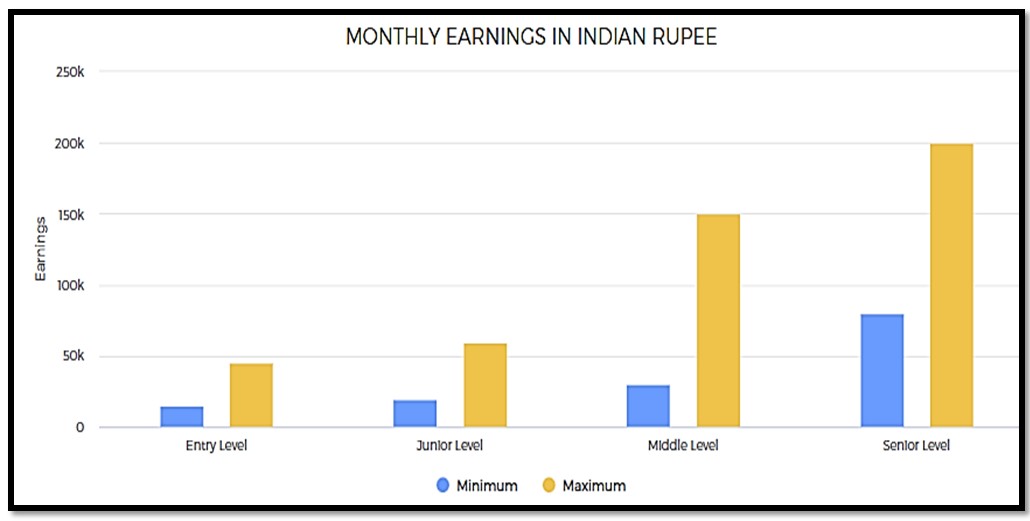
Entry level: 0 - 2 years of work experience
Junior Level: From 1 to 12 years of work experience
Mid-Level: From 5 to 20+ years of work experience
Senior Level: From 10 to 25+ years of work experience (there could be exceptions in some high-end technical, financial, engineering, creative, management, sports, and other careers; also in the near future, people will reach these levels much faster in many careers and in some careers, these levels will have no meaning as those careers will be completely tech skill driven such as even now, there is almost no level in a Cyber Security Expert’s job)
Work Activities
1. Identifying objects, actions, and events - Identifying various characteristics of objects; observing and understanding actions and events; understanding changes in actions and events.
2. Getting Information and learning - Observing, hearing, reading, using computers, or otherwise obtaining information and learning from it.
3. Analysing and interpreting data and information - Analysis of data and information to find facts, trends, reasons behind situations, etc.; interpretation of data to aid in decision making.
4. Operating machines, equipment, devices, systems and processes - Using various methods and techniques to operate machines, equipment, devices, systems and processes in industrial and other settings.
5. Processing information - Compiling, tabulating, calculating, auditing, verifying or otherwise dealing with information processing including data entry, transciption, recording, storing and maintaining databases.
6. Using computers for work - Using computers for day-to-day office work; using computer software for various applications in day-to-day professional work; entering data and process information; for writing.
7. Communicating with co-workers and others - Communicating with people in writing, verbally or otherwise inside your workplace and various other people who have professional relationships with your place of work including vendors, government officials, etc. or with people at large.
8. Creative thinking - Developing new ideas, concepts, innovative solutions to problems, newer ways of getting things done, designing products and services, creating work of art and craft, etc.
9. Strategic planning - Developing visions and goals, developing strategies and action plans for achieving visions and goals.
10. Making decisions and solving problems - Analysis of data and information; evaluation of alternative decisions and results of decisions; taking the right decisions and solving problems.
11. Organizing, planning and prioritizing tasks - Planning and organising tasks in order to achieve work goals; prioritizing tasks to achieve goals and making the best use of the time available.
12. Updating and using relevant knowledge - Keeping updated with the latest knowledge relevant to your fields of work and use of the relevant knowledge in getting things done.
Future Prospects
The road ahead for this career pathway seems uphill. Agriculture and allied industries constitute a situational priority of the Indian Government especially when the population is burgeoning. By 2024, the Agriculture Export Policy aims to increase India’s agricultural exports to 60 billion US Dollars if under optimistic growth scenario. The country is also the world’s 2nd largest fruit producer after China. Indian Food and Retail market is expected to reach 482 billion S Dollars. The Food Processing sector in India is expected to generate employment for over 9 million people countrywide by 2024. The global Packaged Food market will be worth approximately 3.03 trillion US Dollars.
The Indian Life Sciences industry is expected to sustain a growth rate of 11 to 12% and reach around 8 times its current size to grow to approximately 200 billion US Dollars by 2030. This growth trajectory is expected to remain more or less uniform throughout this period. This will contribute to the country’s trade balance 5 to 6 times more than it does now to an approximate amount of 60 billion US Dollars by 2030. This will also help in neutralizing India’s energy imports to a decent 15% (approx.) by 2030. The Indian Biotechnology industry has the potential to grow to a decent size of 100 billion US Dollars by 2025. Biopharma is so far the largest sector contributing about 62% of the total revenue distantly followed by bio-services (18%), bio-agri (15%). Britain and India will witness a research partnership of 544 billion US Dollars by 2021. Engineering R&D (Research and Development) together with the product development market in India is predicted to grow at a rate of 10.67% compounded annually to reach 42 billion US Dollars.
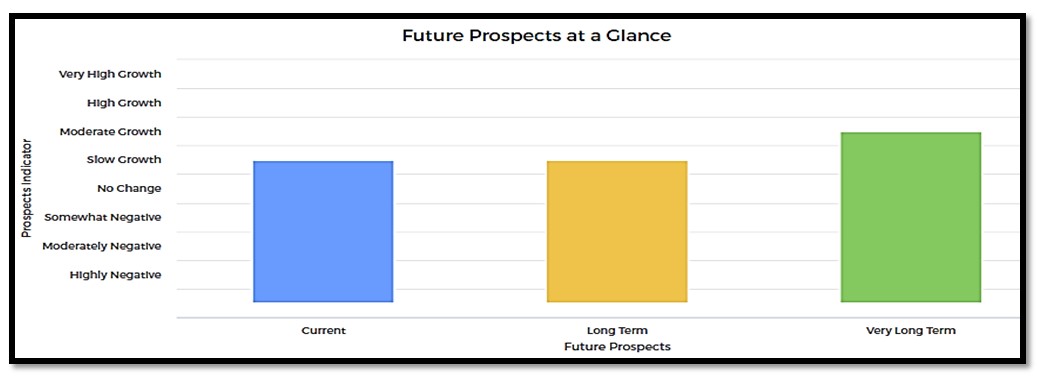
Future Prospects At A Glance
Current (0-1 year) | Long Term (2-5 year) | Very Long Term (6-10 years) |
Slow Growth | Slow Growth | Moderate Growth |


